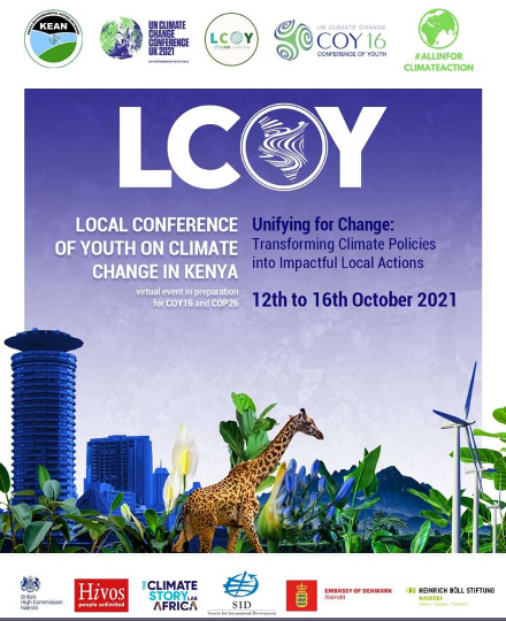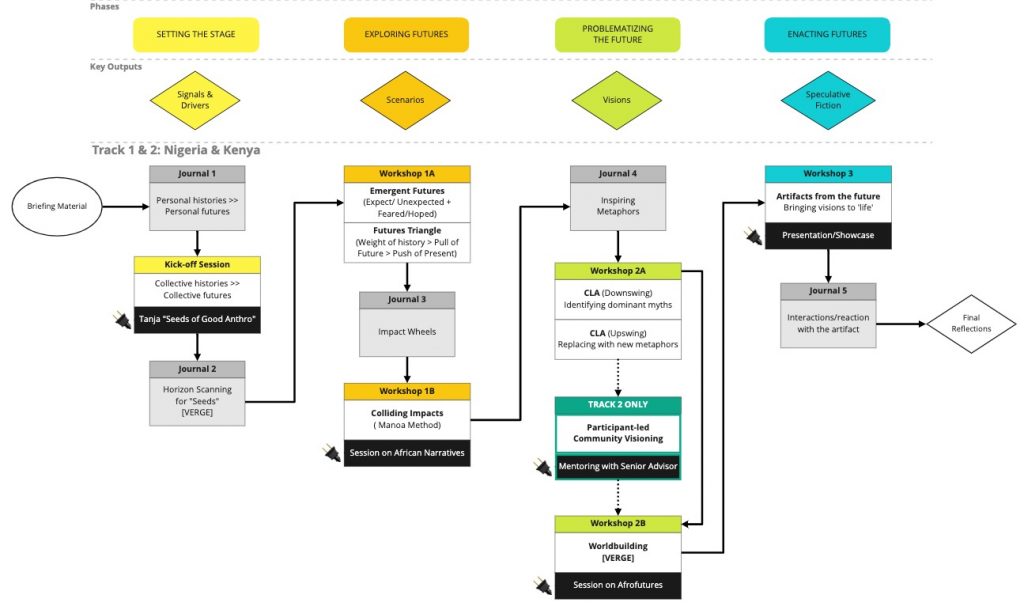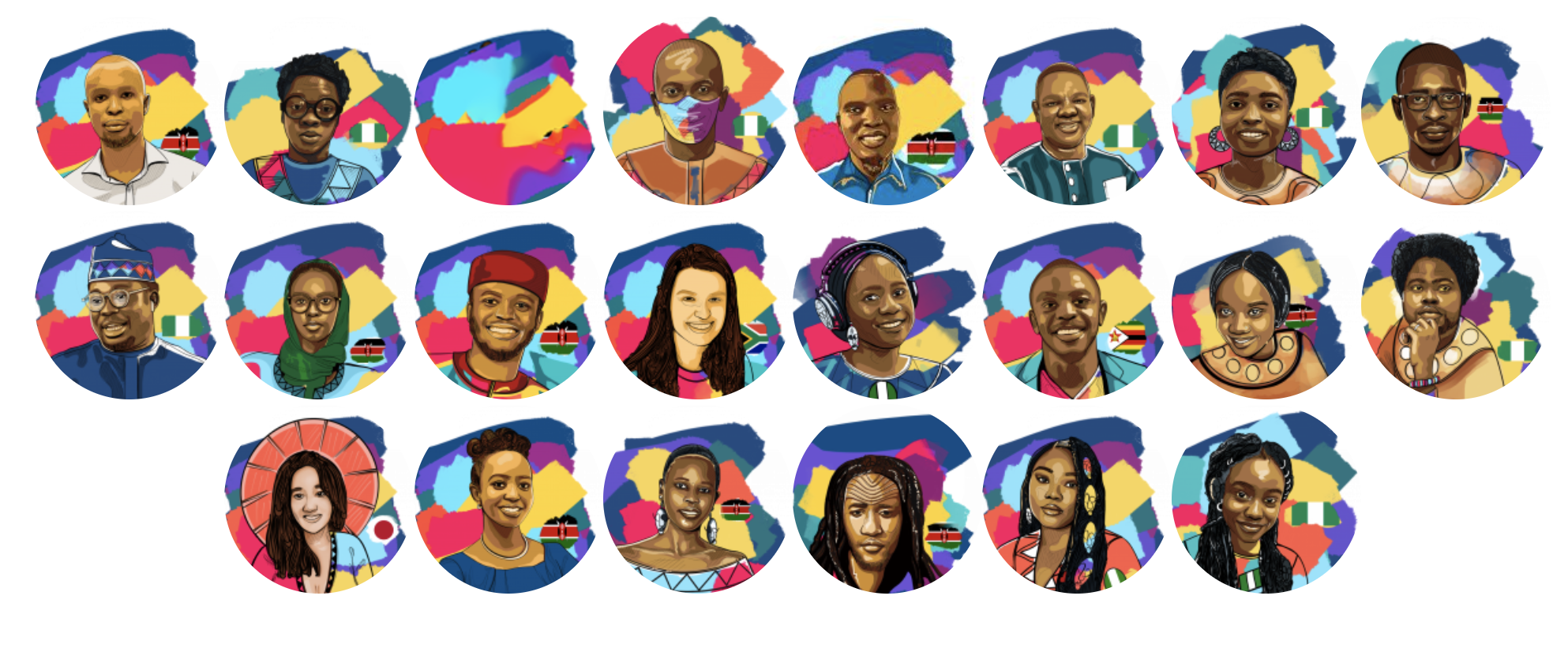Project and Insights
The project is the start of an ongoing conversation designed to transform digital futures across Africa.
In this section, we are sharing more information on the origins, process and purpose of the project, and the “so whats” – the insights from this project – and how you can use these.
Whether you are interested in the project findings or want to know more about the unique design that brought network weaving and participative foresight approaches together we encourage you to read on.
This is the start of an ongoing conversation and we encourage you reach out to us if you would like to be part of the next steps of the journey, or help to disseminate and build on the stories and insights.
- About the project
- Emerging insights
- Six key priorities for change for the sector
- What this might mean for you as governments, technologists and legislators
- What should actors wanting to play a long-term role in this sector consider
- Foresight and network weaving are a powerful combination: process insights
- Continuing the conversation: find our more about how to get involved
- About NGFP
About the project
The NGFP African Digital Futures project convened twenty two next-generation changemakers together with African futurists and next-generation thinkers in early 2021 to launch provocative conversations on data-driven technology as imagined, developed, and used by communities across the continent.
During the process, members of the Next Generation Foresight Practitioners (NGFP) network worked in teams centred in Kenyan, Nigerian, and pan-African communities. Together with our hosts, facilitators and expert guests, the teams used a group foresight process to identify emerging signals and insights, explore alternative future scenarios, and generate visions for the worlds we want to create through stories, new media and artefacts from the future.
In this section we’re sharing some of the insights that emerged from the project from the point of view of those involved. As you explore the stories and engage with the material, we imagine that you will draw your own insights and conclusions. By the participants sharing this material through this portal the intention is that it can be a living and ongoing resource that can be used to provoke conversations
The storytellers involved in the process have already stated these conversations. If you’re interested in joining in or getting in touch, please reach out to us at team@nextgenforesight.org

Iman and Frank have been hosting and promoting dialogue in Kenya including at the Local Conference of Youth on Climate Change
Emerging Insights
Six key priorities for change
Concerns were similar across all three cohorts, but with different levels of priority and nuance. In general:
- Kenyan participants focused heavily on the role of technology to address climate change and environmental issues.
- Nigerian teams were deeply concerned about technologies role in direct democracy.
- The Pan-African cohort highlighted the role of technology in emotional and social experience.
As a collective six key priorities emerged:
- Data needs to be seen as a collective resource for public good. A change of focus from the rights on the individual and the interest of companies that are enshrined in many data protection regulations (e.g. GDPR) to an approach that respects and respond to local culture and cooperative ownership.
- Data to support good governance. A shift from data being used for citizen surveillance to support government accountability transparency and direct democracy.
- Bio-internet and connectivity. Connecting data to the natural world. Technology becomes additive not extractive to nature and the environment.
- Technology as way back not just a way forward. Progress and globalization with not against African languages, practices, cultures and tradition.
- Sincere, humane, and co-designed technology. A focus on the digital divide. Technology is used to meet people’s real needs, not to exclude and divide society.
- African voice. Creators, innovators, scientists, technologists, researchers are able to shape the global conversation.
What this might mean to you as governments, technologists and legislators
- Fixing the Wild west of data governance There are legitimate worries that the absence of rigorous data governance mechanisms is being used to collect and abuse data, by governments and private actors that would otherwise be protected. There is also a sense that there is little appetite to regulate this, thus creating a ‘wild west’. This will need to be fixed.
- Embracing technology while fostering trust Governments can be too quick to embrace technologies without necessarily educating or communicating the opportunities, benefits and risks to citizens. This, happening in a situation of protracted mistrust of government, leads citizens to either boycott or explore ways and means or avoiding or defeating these technologies.
- Assuring the safety of data To the extent that data is captured and hosted on systems that are not even under the control of the governments themselves, how can governments assure the safety of the data they collect? Are private players in this space more powerful than governments themselves?
- Enabling local data governance Legislators are seen to be poorly prepared for the task facing them. There is hardly any local philosophical grounding for what local governance policies should embrace and promote and discussions on this subject are sketchy at best and open to influence from outside subjects. There will need to be a critical focus on creating a deeper understanding of the risks and opportunities and embedding these within home-grown notions of what data governance wants to achieve. There is also a weak technocratic base resident in local governments that understands the issues and that is able to guide policy formation around these matters. This is why ‘cut and paste’ policies are being adopted with little debate or thought.
- Driving national-level conversation Given that connectivity is here to stay and given the extent to which it is going to be a critical factor of innovation and competitivity, there is a need to have national level conversations about the potential the IT sector can play and how data per se permeates all other sectors and how we – as citizens – will need to interact with data centres, processors and also as data producers and consumers. Thus national level sensitization campaigns driven by a clearly defined public interest will need to be formulated and hopefully bring together all the players to work together.
- Promoting data as a public good. The notion of data as a public good needs to be cultivated and promoted. This should happen as a matter of national interest and with a view to promoting development at all levels. If it is recognized as such, it will (and should) trigger different conversations about its role in our societies and how we want to manage it.
What should actors wanting to play a long-term role in this sector consider?
- Increasing attention towards private sector from government Expect more efforts to enforce regulatory standards and to ensure that ‘national standards’ – however defined and arrived at – are followed. Consider the recent announcement by the Ethiopian government to establish homegrown alternatives to the key social media platforms (Twitter / FaceBook / Instagram) that is perhaps driven more by intentions to enforce censorship of ‘undesirable’ material.
- Growing divergence between society and leaders present opportunities for innovation To the extent that there is a growing divergence between the aspirations of society and the leadership (as evidenced by growing inequalities and dissent), there will be robust efforts to disrupt the space and any ecosystems that might offer opportunities for ‘dissidents’ to organize and converse. It will be equally important to consider key social and economic trends in the countries and the trajectories they represent (growing convergence or divergence).
- Spending time engaging and sharing to really understand Engagement with key actors (business, government, civil society, individuals) is needed to explore diverse perspectives and how thinking is evolving within different societies, and to understand the implications this might have going forward.
Foresight and network weaving are a powerful combination: process insights
This project was an NGFP initiative as part of our Africa Network. It aimed to demonstrate the value that the cohort of participants can bring, to explore the potential of foresight and network weaving in unlocking transformation, and to build the skills and capability of the next generation who will be driving this transformation across the Africa continent over the coming decades.
It was designed to support them to come together, to find their voice, create change and to build confidence.
For those of you interested in beginning process of transformation in foresight, we used a novel design – a spice-box of methodologies – that embraced principles of decolonisation, transformation and afrofuturism. You can read more about the process in this note and we’ll be publishing more information in an upcoming Routledge Collective Intelligence Handbook. The approach embodies one of the principles of the NGFP network which seeks to highlight the importance of emerging approaches being designed and championed with and in communities around the world.

For those of you interested in practice of network building using foresight to create communities for change this is what we learnt:
- Everyone changes. It can be hard to share and capture the impact that the process has on the individuals and the cohort. It is easier to capture the commitments and tangible outputs from the process than the internal change this creates. However, participants have told us that this has been a profound experience. As one participant said “if it [the process] ended now, it would still be hugely successful”
- The process starts from the self but ends in empowerment. Re-imagining one’s internal relationship to the forces of technological narrative enables participants to become agents of disruption as individuals and as a network. “We learned that we have novel solutions to our existing conditions”. “The voice….I realized, is us. At the very least, this entire sensing network gets to echo that voice that will shape our conversation. We are really empowered and I think we can keep spreading that light.”
- Unity in diversity. We were all so different from different backgrounds, but at some point we started seeing common interests from the diverse voices representing. Turns out we’re all kindred spirit.
- Integration. Don’t separate creators from content. Don’t separate content from context.
- Time is a design element. Relationships and trust take time to build. Constraints create productive pressure.
- Culture of dialogue. The visions aren’t the end, but a starting point for many conversations, with many different types and groups of people. The process itself is swift and transformative. The rest of this takes more time.
- Change the frame. We can’t just change the place and the people, need to change the frame to get to different conversations and avoid the global technology and policy echo chamber
- Rich and tangible outcomes. The experience was unique and particular to all of the individuals participating, but has led to rich and tangible outcomes. The resources shared on this portal have subtle nuances that can be explored many times in many ways. The process has also led to new collaborations, initiatives and projects including a new Centre for Futures Studies at University of Lagos.
Continuing the conversation: find our more about how to get involved

We are inviting you to engage and share the material on this portal. Please do download and share the stories, artefacts and images. We would love to hear your feedback and insights, and any information on how you end up using the material.
We’re sharing here a few of the next steps and conversations that the cohort would like to take. If you’d like to get involved or to support these initiatives then please get in touch at team@nextgenforesight.org
What the cohort would like to do
- Establish a data working group to drive the conversation. The cohort wants to establish a working group that can meet on a monthly or quarterly basis to continue the conversations, build ongoing collaborations, and monitor outcomes from the project. The hope is to include other partners to host new events and conversations for other Africans to join, and to help drive thinking about futures literacy and digital societies.
- Set up a network of Young African voices to improve policy and operational decisions. Young Africans imagine using open data to better support citizens and governments and to drive accountability/transparency and public debate to reduce potential harms from new technologies and achieve more justice. The proposal is to establish a network of future data stewards across the continent and bring them into dialogue with African and global policy makers and local and international technology companies to improve policy and operational decisions.
- Initiate two national dialogues on digital futures. The cohort identified a need to build coalitions, socialising and exploring the scenarios with different actors – whether national regulators, policymakers, technologists, academia, communities – through new conversations in Kenya and Nigeria focused on digital futures.
- Drive Pan-Africa and regional dialogues on thematic areas of interest. Embedding insights into policy-making processes, testing with global technology companies, and connecting into conversations that are already happening within Africa and beyond, such as in the African Union, AU-EU Cooperation, and EU/US tech companies.
About NGFP
Next Generation Foresight Practitioners. Enabling the next generation of changemakers.
The Next Generation Foresight Practitioners (NGFP) programme exists to accelerate the transformative potential of the next generation of changemakers using foresight as a key tool to envision inclusive and equitable futures globally.
It supports emerging voices by driving their integral role in agenda-setting and connecting them with today’s decision-makers, amplifying their voices and insights. It aims to democratise futures around the world.
The programme is run by the School of International Futures (SOIF) with the support of Omidyar Network, Small Foundation and Humanity United.
Through the NGFP Programme and Annual awards and the programme we are:
- Catalysing collaboration and network building through the sensing network of over 500 next generation practitioners
- Enabling communities to come together around sectoral issues to drive participation across new geographies and sectors
- Supporting the next generation of leaders in Africa through a six-month leadership programme funded by Small Foundation
- Building demonstrator projects to demonstrate the value of NGFP perspectives through projects and collaborations with the Omidyar Network and WHO Western Pacitic Regional Office
- Activating the potential of the sensing network and wider community through our impact fund, mentoring, and network building activity
Find out more at nextgenforesight.org or contact us at team@nextgenforesight.org